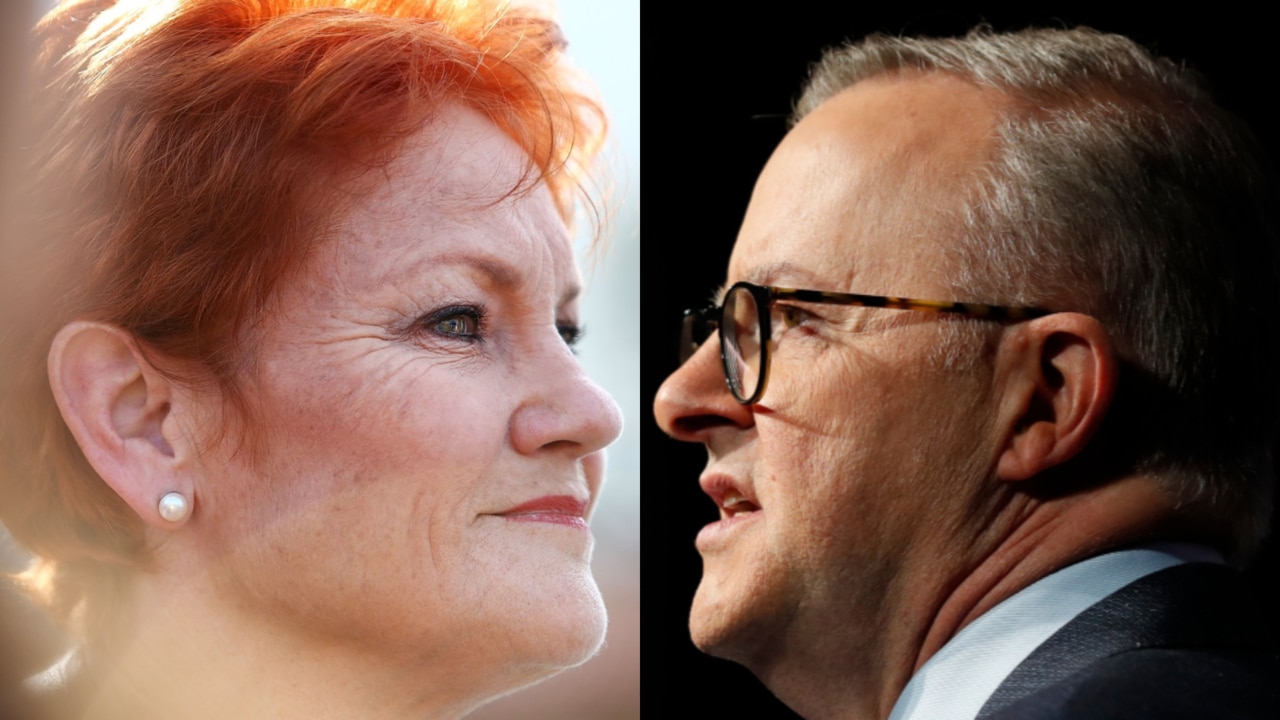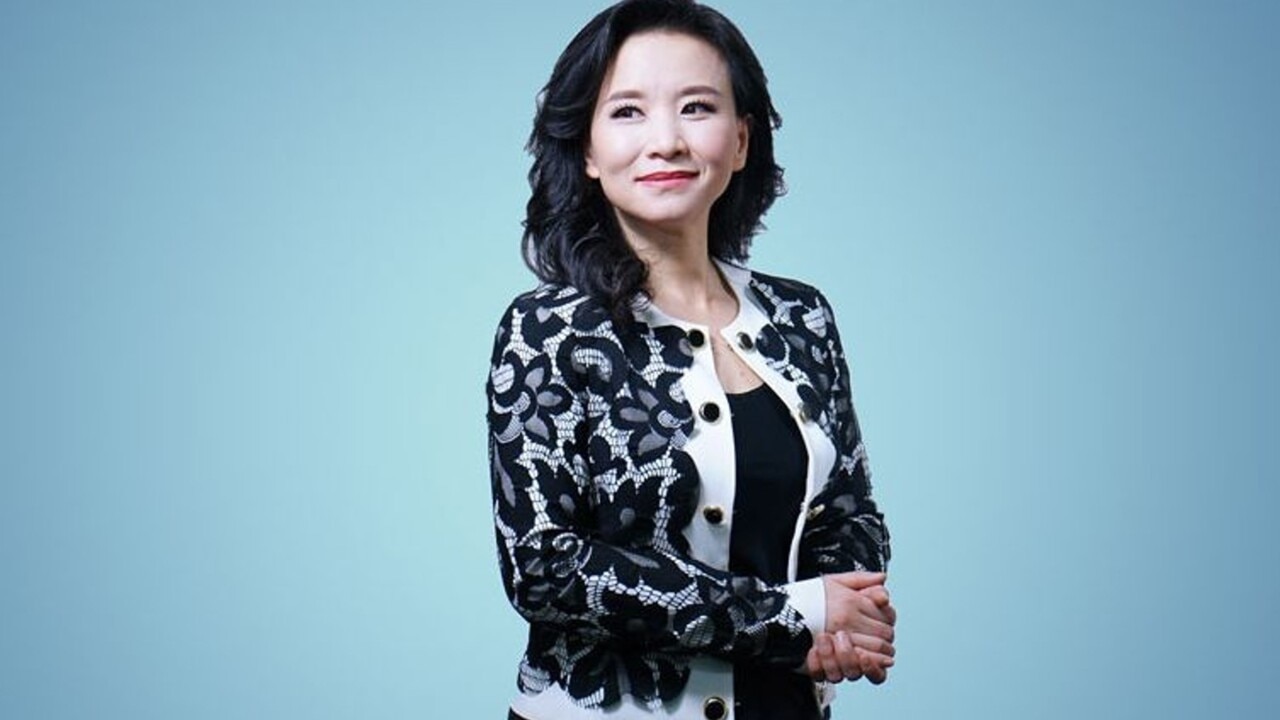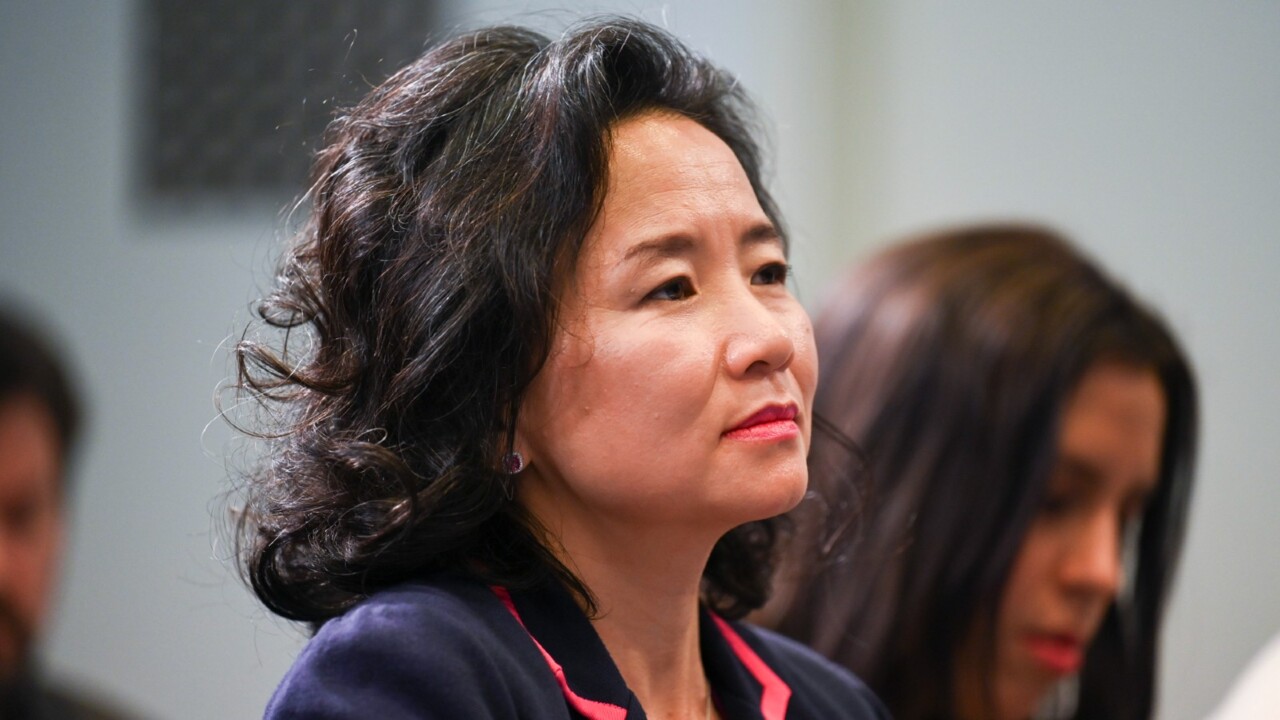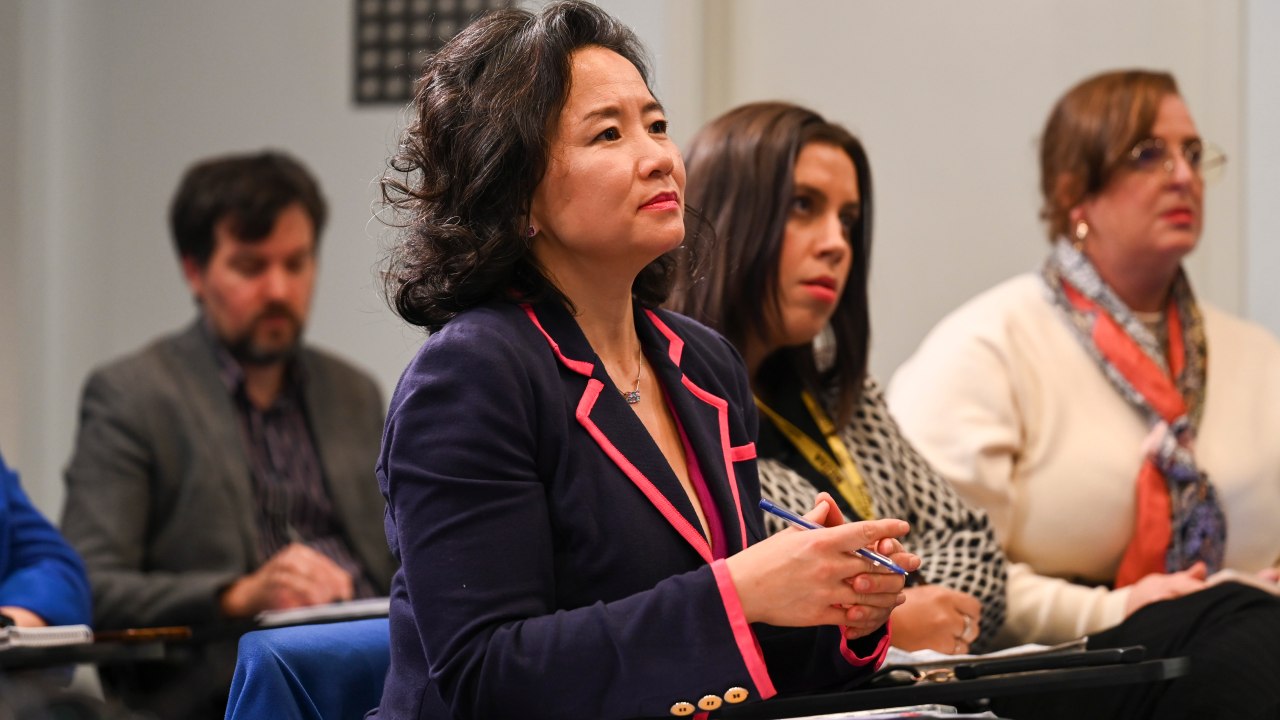Australian TV journalist Cheng Lei was blocked from entering a second major government press event just hours after Chinese embassy staff created a bizarre diplomatic incident by attempting obstructing her view.
SkyNews.com.au can now reveal Cheng was also prevented from entering a second press event at the Hyatt in Canberra later in the day where Chinese Premier Li Qiang was attending, despite being registered well in advance.
The Hyatt incident marks the second time Cheng was prevented from effectively reporting on the Chinese delegation.
After spending nearly three years detained in China on trumped up charges, Cheng had become an uncomfortable reality of issues with press freedom for the Chinese delegation.
Her crime was accidentally breaking the embargo for a government press release in mainland China at state TV network by a few minutes.
The veteran reporter has set out the series of events which led up to each incident, and revealed Australian media minders from both sides of politics prevented her from entering the second event.
Cheng details the moment a media minder from the Department of the Prime Minister and Cabinet told her she could not enter the event, while a representative for Opposition Leader Peter Dutton was aware she could not enter, and did not assist.
The fresh incident raises questions about what domestic freedoms to report openly have been eroded by efforts to amend Australia’s diplomatic relationship with China.
In her own words, Cheng Lei describes multiple efforts to shut down her journalism at diplomatic events
Monday, 9.34am, Chinese delegation event at Parliament House
I made my way outside parliament house and stood in the throng of reporters and photographers. Pretty soon I noticed Chinese people nearby were talking about me – it wasn’t immediately apparent whether they were friendly or not.
After seven months out I have developed sensitivities about how people react to me–if they recoil, or admire, especially Chinese people.
An SBS radio host was one of the latter, she called me by name, hugged me with tears in her eyes and said she had been the newsreader when I was released and she was so excited for me. A friendly chat with her later, she told me a young man in a blue suit with a backpack was taking notes on me. Ah, one of the two who were obviously checking me out, I felt their gaze from my peripheral vision.
I walked over to him while he typed on his phone – maybe he was texting “aargh! Cheng Lei is here!” – a thin short-haired woman with pleasant features in a long brown coat quickly came over and alerted him to my presence. He left and she stood next to me instead.
After we watched the welcome ceremony for a while, she turned to me and asked with a smile: “Journalist Cheng Lei, I used to watch your show all the time”.
“Nobody watches TV,” I tried to make out where this was going.
“Really, I did,” she responded.
“Are you Xinhua?” I asked. If not the state news agency, then the embassy.
“No, I work for the embassy, in the media section,” she said.
“Oh.”
“Are you going to the lunch?” she asked, referring to the Li-Albanese state lunch.
“No, I haven’t been invited.”
“So they just invited you to the welcome ceremony?”
“Well…”
“Are you going to other events too?”
“I’ll see how I go.” I said noncommittally.
Even before the exchange it occurred to me the Chinese would get nervous about my presence. There was a slight fear I wouldn’t be allowed to go to the Albanese-Li press event. But surely they wouldn’t be allowed to do that.
“It’s a very important visit…”, she implied: “don’t make trouble.”
“I know what’s important,” I implied: “do you think I’m so petty and unprofessional?”
“Of course I trust your journalistic expertise and integrity,” she said.
“You seem to be nervous.” I said bluntly.
“Not that nervous.” She looked away.
The welcome ceremony ended and I went inside parliament house to prepare for my next live cross, during which I mentioned this incident. I wondered what her higher-ups would say or do.
Midday – Li-Albanese press event (signing of agreements and joint remarks)
My cameraman and I went inside the room with all the other journalists and photographers. The left of the front row was reserved for Chinese ministers and the right for Australian ministers. I chose a seat in the second row on the left because my cameraman would be filming from the podium on the left.
Making small talk with other journalists, I noticed a Chinese state TV cameraman in the front row either filming me or framing the shot of the front row.
A man entered the room who I immediately recognised as Wang Wenbin, China’s ministry of foreign affairs spokesman, soon to be ambassador to Cambodia. I was told he had been asked about my case many times while I was incarcerated. He recognised me too.
Later I was told by a journalist sitting in the back that he’s the one who directed the Chinese embassy staff to stay on me. The Chinese ministers came in and took their seats.
As the event was about to start, Blue Suit came to stand diagonally in front of me to block me from the cameras. A PMC staffer told him repeatedly to move, to no avail, Brown Coat came to tell the PMC staffer he was Chinese media, as if that excused him. He didn’t budge.
Nobody else was standing in the rows of seats, everyone was sitting–it is not a rock concert, it is a serious event.
I tried to take in what was happening with the signing. My colleagues sitting in the same row were also distracted by what was going on next to us.
Katina from the West Australian volunteered to swap seats with me. I thought, ah, now I can concentrate on the news at hand. But Brown Coat quickly came over to try to stand next to me, another PMC staffer saw what was happening and stood next to me instead, keeping her away from me. Blue Suit still stood there.
For a moment it reminded me of being in RSDL (Residential Surveillance at a Designated Location) where shifts of two guards were glued to me every minute of the day.
Due to the wacky game of musical chairs and tag, we were now up to the second document – I had missed it and had to ask colleagues what was first signed.
I concentrated on the joint remarks – when I caught prime minister Albanese’s eye, I smiled at him. It can’t be easy, being in his position, pulled in so many different directions and judged every minute for everything.
As the officials left, I saw the PMC staff having a word with the Chinese embassy staff. I hoped it was to tell them their behaviour was not on.
The journalists around me were incredulous at what they’d just witnessed. They’d taken videos and the reports started to go around, I also talked about it on NewsDay with Kieran Gilbert.
At the 2.15pm PM presser, I joked with fellow journalists that now I was on safe ground. I appreciated the fact I got the first question – What are both sides doing to ensure the “twists and turns” in the bilateral relationship don’t reoccur? The second question was about the blocking incident.

What happened after Cheng was first blocked by Chinese embassy staff?
After the story broke, a different tack was taken at the Li-Dutton press event.
My cameraman and I got to the Hyatt around 3:45pm.
The meeting was due to start at 4:20pm. I hadn’t met Mr Dutton before and I knew he had also spoken out to advocate for my freedom, so I wanted to say hi and thanks in person.
We stood in the foyer where everyone was milling. As the Chinese delegation was staying at the Hyatt, there were many Chinese people there, including Brown Coat and Blue Suit, who I learnt was the most junior at the embassy and on his first overseas posting.
“It’s not awkward at all,” I said sarcastically to my cameraman, wondering if the two were being lauded internally for determinedly blocking me or being criticised for not being flexible enough to avoid a scene.
The Chinese (including Brown Coat and Blue Suit) were talking to the PM media staff. I then heard the words among themselves in Chinese:“This is our turf, we can veto it”.
The PMC media staff came to tell me I wouldn’t be allowed to go in–because I wasn’t confirmed on the list, but my cameraman could. She asked me if it was alright. It was the sort of “Is it alright?” to soften something that’s not alright.
“Well what else can I do, storm the place? ” I asked.
“But I’ve been registered since last week,” I said, remembering our bureau chief had put me on the list.
“Well…that’s only an expression of interest, Dutton’s team can decide who gets to come in, you’re not on there,” they replied.
Questions swirled around in my head, did this mean Dutton’s team didn’t want me there?
Later, a man came to introduce himself as being part of Dutton’s team and I told him I was being kept out. He gave me a conspiratorial look and said “I’ll get you in.”
The rest of Dutton’s team hadn’t bothered to introduce themselves at all – or were they ignoring me for fear of trouble?

4:10pm
Two Chinese men came down the stairs. Gao Feng, commerce ministry spokesman and Wang Wentao, China’s commerce minister. Gao spotted me and stopped dead in his tracks – he turned to Wang and I could hear “Cheng Lei”…followed by a long whispered explanation. When they walked past me to go into the meeting room Gao made a point of turning sideways, away from me.
4:15pm
Premier Li and his entourage arrived, there were many people shielding him away from me as they went into the meeting room. I had heard he was tired and wanted to rest.
4:20pm
Peter Dutton arrived, with Simon Birmingham and others. Nobody made eye contact with me. They greeted the Chinese officials and walked into the meeting room.
I was still confident I could go in, because the man from Dutton’s media team had assured me he could get me in.
But when people started to go in and I followed, calling his name loudly several times, he didn’t turn around.
I was then tapped on the shoulder by the PMC media staffer, motioning that I can’t go in.
“It’s just for the picture journalists, sorry,” she said. I could see she was under strain and it cannot have been easy dealing with the Chinese delegation.
I sighed and waited outside.
After the talks started, I saw someone slip in. I asked the PMC staff, “how come anyone can go in but me? Who’s checking credentials? So all this is just about keeping me out?”
She reiterated the line that both sides agreed, I wasn’t on the list.
A while later, she came to ask me, “were you recording our conversation? Because the story’s really hot.”
She was worried I would blab about her role.
“No, I don’t do stuff like that,” I said. I was disgusted. If I wanted to create drama, things wouldn’t be like this.
I had declined many interview requests. To prepare for reporting in Canberra I had interviewed business leaders, diplomats, human rights activists, bureaucrats. I knew how much was at stake and how difficult the intricate balance was among stakeholders. I can only imagine the craziness in the background to craft the perfect image for public consumption.
I am very much a shades of grey person. Nor do I want to cause personal harm.
But she doesn’t know me. So when I asked who the Chinese man standing next to the wall was, she said she didn’t know the people on the Chinese delegation except for her media counterparts. I asked who Brown Coat was, her face froze. Pause. Pained look. “I don’t know,” came the lie. But you just said you know your media counterparts?
She turned and left.

4:40pm
So what happened? I asked when Dutton’s media officer came out. “The list had you Trudy(McIntosh) Cam (Reddin) and Dave (cameraman) but XXXX was doing it and …” he trailed off.
He looked sheepish when I asked for an explanation. He then offered me some soundbites with Peter Dutton after the meeting.
I waited till 5pm, the talks were still not finished. My flight was at 6:05pm.
I could have taken a later flight to do the Dutton interview, but what decided it for me was the realisation that I was the least wanted person there. In fact I jokingly said it to Dutton’s team and no one denied it.
Was I a pariah? Was I the uncomfortable reminder of bad times best buried? Was my existence the fly in the soup?
I scanned around the hotel, there were Chinese officials and delegates standing in corners, talking in groups, a lone man in a beige jacket stood near me almost for the whole time I was there, spy or security?
I once could have gone up to any of them and said hi, talked about the visit, how stressful it was, where to eat, how their families were, what was happening in their fields. I once thought I could be the one to explain Australia to the Chinese and China to the Australians, to group everyone together and have fun.
Now diplomats were risking ridicule to keep me out of sight. I was not chanting slogans or bearing placards or doing anything except try to see what was going on and tell people about it.
What did they think would happen? I would heckle Li? (I most certainly would not. It is neither in my nature nor in line with my professional standards.) Li would be upset at being in the room with an ex-con? It was a smaller room so blocking me from the cameras would be harder? That I would be biased in my reporting because of my experience?
Why could I not turn up? I had served my sentence and was deported. I am employed by an Australian news organisation. I got a media pass for Parliament House. I don’t act out of turn, why do they?
The worst thing about being bilingual and bi-cultural is that I see it all. The Chinese side and the Australian business community would prefer the friendly facade. Some of my Aussie business contacts went silent after my story broke out – I think they wish I hadn’t been there and courted trouble, because then the visit would have gone smoothly, everyone happy happy.
I wondered if all the Canberra bureaucrats were annoyed at me – if I hadn’t been there, their efforts for the visit would have achieved a much better outcome, there’d be less media scrutiny and criticism. I wondered if the Chinese are going to ask for lists of reporters the next time there’s an official visit, learning from their mistake and going for a behind the scenes coercive approach. Thankfully we don’t give them out due to privacy requirements.
Media requests tumbled in by the dozen. Friends sent me links from many outlets.
It is always a mistake to read online comments I’ve been called a spy, a drama queen and a clown in the Chinese comments of international news outlets. I was accused of “making it about me” in the English comments of Australian news outlets. Some wondered what the fuss was – I wasn’t hurt, it was a storm in a teacup. Sky was accused of pulling a publicity stunt.
To clarify, I put my hand up to cover the Li visit in Canberra because I have the skills, insights and contacts perfect for this important Sino-Australian story. Sky sent me because of it. Of course it’s special, because I was there and now I’m here – ain’t freedom grand?
I went through the other criticisms in my head…I am sorry for being part of the 24-7 news cycle that makes political survival the priority for politicians rather than strategic vision and statecraft. I do not like the feeling I am fodder for China hawks or an unfortunate existence for China doves.
I am sorry for “hijacking” the reporting on the visit – should I have kept quiet about it until afterwards? But people around me saw it all. Should I not have gone?
I am not surprised by the appeasement of the Chinese, we are a middle power and this is our biggest customer, we can show displeasure but we cannot give the finger.
I didn’t like being lied to by the PMC staffer – but distrust of journalists is a survival must for bureaucrats in Canberra.
In spite of it all, it makes me appreciate our freedoms that much more.
Imagine the Chinese press being housed inside China’s Great Hall of the People. Imagine NPC (National People’s Congress) delegates arguing about policy in colourful language being broadcast live. Imagine hundreds of protesters at a foreign dignitary’s visit, shouting during the military band performance.
Imagine a bilateral press event in China, with simple security and no vetting of the attending journalists, imagine Australian embassy officials breaching protocol in the middle of bilateral agreement signing – in a room full of Chinese press. Imagine camerapersons who don’t have to be trained in exactly how to shoot “leaders” and how to shoot these events.
Imagine frequent pressers, with opportunities to ask “leaders” unscripted and unvetted questions. Even lob criticisms. Imagine allowing reporting and debate around “unfortunate incidents” of any kind that would amount to loss of face.
I think of a quote on China– “It’s all about face, yet they have no shame.”
I am told that footage of the event on China’s all important seven o’clock news Xinwen Lianbo showed me obscured by the tall minister sitting in front of me, I wonder if my cellmates would guess that I was there. They’d love it.

